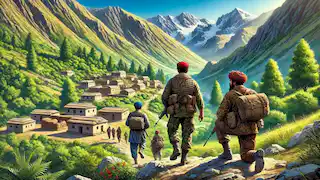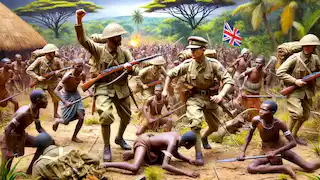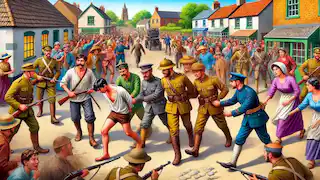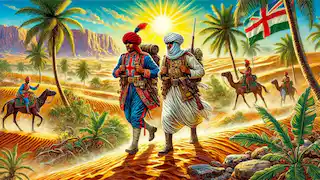The Journey Begins
In the bustling streets of 19th century British India, two adventurous British soldiers, Daniel Dravot and Peachey Carnehan, embarked on a journey that would change their lives forever. Both men, tired of the mundane and hierarchical life in the British Army, dreamed of something more — of becoming kings in a land where no Englishman had set foot.
"Peachy, I tell you, there's gold in those hills, and no government to interfere," Dan said, his eyes gleaming with ambition. They had heard rumors of a remote region called Kafiristan, where the people had not seen outsiders for centuries. The plan was bold: to conquer Kafiristan, unite the tribes, and establish themselves as kings.
Their journey began in the sweltering heat of the Indian summer. The two men disguised themselves as native traders, adopting local attire to blend in. They traveled by train, camel, and foot, crossing deserts and mountains, each step taking them further from civilization and closer to their destiny.
The Encounter
After weeks of arduous travel, Dan and Peachey reached the outskirts of Kafiristan. They had faced numerous challenges — treacherous terrain, hostile weather, and suspicious villagers. But their determination was unwavering.
One evening, as they set up camp near a river, they were approached by a group of armed tribesmen. The leader, a tall, fierce-looking man named Ootah, eyed them with suspicion. "Who are you, and what is your business here?" he demanded.
"We are traders," Peachey replied in the local dialect they had painstakingly learned. "We come in peace, seeking to exchange goods."
Ootah was not convinced, but he was intrigued by their bravery. "Traders do not venture this far. Follow us, and we shall see what our chief decides."
The tribesmen led Dan and Peachey to their village, nestled high in the mountains. The village was a stark contrast to the Indian plains — cold, isolated, and seemingly untouched by time. The chief, an elderly man with a commanding presence, scrutinized the two strangers.
"We seek to learn your ways and offer our friendship," Dan said, bowing respectfully. "In return, we bring gifts from distant lands."
The chief, intrigued by the foreign goods they presented, decided to let them stay. Little did he know that these two men harbored ambitions far greater than mere trade.

The Rise to Power
Over the next few months, Dan and Peachey ingratiated themselves with the villagers. They shared knowledge, taught them military tactics, and helped resolve disputes. Their influence grew, and so did their legend. Dan, with his commanding presence and strategic mind, became the de facto leader, while Peachey, with his wit and diplomacy, acted as his right hand.
One day, a rival tribe attacked the village. Dan and Peachey led the defense, their superior tactics and weaponry turning the tide of the battle. The villagers, in awe of their prowess, began to see them as more than just traders. Whispers of their divine origin spread, and soon, the people started to worship them as gods.
Emboldened by their success, Dan declared himself king. He donned a crown made of gold and jewels, taken from a hidden temple they had discovered. Peachey became his chief advisor, and together, they set about uniting the neighboring tribes under their rule.
Their reign was not without challenges. Some tribes resisted, but Dan's charisma and military prowess, combined with Peachey's cunning, won them over. They established a capital, built forts, and created a rudimentary system of governance. For a time, it seemed their dream had become reality.

The Fall
However, the seeds of their downfall were sown by their own hubris. Believing themselves invincible, Dan began to demand more from the people. He introduced harsh laws and levied heavy taxes to fund his grandiose projects. Peachey, once the voice of reason, found himself increasingly sidelined.
The final straw came when Dan announced his intention to marry a local woman, Roxana, to solidify his divine status. The villagers, who revered their gods but also feared their wrath, were horrified. Roxana, terrified at the prospect of marrying a god, bit Dan during the wedding ceremony, drawing blood.
The sight of Dan bleeding shattered the illusion of their divinity. "He is no god," the villagers cried. "He is mortal, like us!" Panic and anger spread like wildfire. The villagers, feeling betrayed, turned on their erstwhile rulers.
Peachey tried to reason with them, but it was too late. Dan, in a final act of defiance, ordered their guards to hold the villagers at bay. But the guards, seeing the tide turn, abandoned them. Dan and Peachey were captured, stripped of their finery, and brought before the vengeful mob.

The Price of Ambition
The villagers, now united in their anger, decided to make an example of the false kings. They bound Dan and Peachey, parading them through the village as a warning to others. Dan, defiant to the end, held his head high. Peachey, devastated by the turn of events, tried to appeal to their humanity but was met with scorn.
In a cruel twist of fate, the villagers decided to execute Dan. They forced him to walk a narrow bridge over a deep gorge. Dan, maintaining his dignity, walked steadily, but the villagers cut the ropes, sending him plummeting to his death.
Peachey was spared, but not out of mercy. They crucified him, leaving him to suffer as a living reminder of their betrayal. Days turned into weeks, and Peachey endured unimaginable pain. His once sharp mind now dulled by agony, he clung to life out of sheer stubbornness.
One day, a passing trader found him, barely alive, and took him down. Peachey, broken in body and spirit, was brought back to civilization. He wandered aimlessly, a shadow of his former self, haunted by the memories of their rise and fall.
The Tale Retold
Years later, in a small, dimly lit room in the bustling city of Lahore, a weary and disheveled Peachey Carnehan recounted his story to a journalist. His eyes, once full of mischief and ambition, now reflected a deep sorrow.
"We were kings, I tell you," Peachey said, his voice trembling. "We had it all, and we lost it because we forgot one simple truth — we are but men."
The journalist, captivated by the tale, wrote it down, preserving the story of the two men who dared to dream beyond their station. Peachey's story became a legend, a cautionary tale of ambition, power, and the price one pays for overreaching.
Peachey lived out his days as a broken man, but his story lived on, a testament to the folly and bravery of those who seek to carve their destiny in lands unknown.


















